- Home
- Rose Tremain
The Road Home Page 21
The Road Home Read online
Page 21
“Just as they keep ‘running out’ of electricity. But build a hydroelectric plant above Baryn and you’ve got uninterrupted, renewable power for the whole region way into the future.”
“Except half the region will be drowned.”
“Exactly.”
Lev heard Rudi sigh. “I’ll keep my ear to the ground, Lev. I promise. Hope Rivas’s official car breaks down, so then he’ll have to hitch a ride in the Tchevi—and he’ll be at my mercy. But enough of all that. It tires me out, thinking what the world could do to us. Tell me about l’amour, Lev. Are you acting like a teenager? Are you spending all your hard-won cash on red roses?”
When Lev got home to Belisha Road late one Friday night, he found Christy sitting in front of two unopened cans of Guinness.
“Celebration,” he said, as soon as Lev came in. “Angela changed her mind. We can take Frankie to Silverstrand on Sunday.”
Lev took off his anorak and sat down. Kissing Sophie in the street, then watching her ride away from him, had left him feeling frustrated and cross. He’d felt almost violent toward her, capable of pushing her against a wall and fucking her right there in the street, like the desperate adolescent Rudi imagined him to be. In his mind, he accused her of playing games with him.
“After all that bloody palaver,” Christy continued, pouring the stout, “after making me suffer like that, she just phones up and says okay she’ll bring Frankie round Sunday morning and we can go to the sea if we want.”
Lev and Christy drank the Guinness. Christy laid his head on the heel of his hand. “I think she’s only agreeing,” he said quietly, “because Myerson-Hill’s taking her out somewhere and she doesn’t want Frankie to ruin their lovely romantic day. Expect they’re going to Hampton bloody Court in a barge, or something. But I don’t care. As long as we can have a beautiful day, I don’t mind.”
Lev smiled. He felt himself begin to transcend his frustrated mood. He imagined gulls bickering above a quayside and the scent of seaweed and a salt wind. “Don’t worry,” he said. “We will have a beautiful day.”
On the train to Silverstrand, Sophie suggested a game of I Spy.
“Are you sure you want to play that, darlin’?” Christy asked his daughter tenderly. “Because I’m not sure your spelling’s that good yet.”
Frankie didn’t reply, just pushed at Christy’s thin arm, trying to move him farther away from her.
“I bet her spelling’s brilliant,” said Sophie. “So: I spy with my little eye something beginning with . . . F.”
“What’s F?” said Frankie.
“You have to do phonetic stuff, Sophie,” said Christy. “That’s the alphabet she knows. F is fuh.”
“Oh, right,” said Sophie. “You can tell I’m a totally sad person upon whom nobody has fathered a child, can’t you? Okay, Frankie. Something beginning with fuh.”
As Sophie said this, she looked at Lev and giggled. He thought, She’s like some exotic dish that I don’t yet know how to make, but yearn for in my dreams. He turned away from her, moving his gaze to Frankie, who was staring worriedly out at the fields of Essex. She had a small, angular nose that she began to press up against the glass.
“Give up,” she said.
“No. Bollocks. Don’t give up,” said Sophie. “Something beginning with fuh.”
Frankie was wearing pink jeans with a pink top and a little furry body warmer. On her knee she carried a matching pink rucksack, which she’d refused to surrender as they’d boarded the train and now clutched tightly to her.
“Come on, Frankie,” said Sophie. “Something beginning with fuh.”
“Tree?” said Frankie.
“No. That begins with a T.”
“Tuh,” corrected Christy.
“Okay, tuh. You see? I’m rubbish at this game. Whose name here begins with fuh?”
“Give up,” said Frankie.
“No, no,” said Christy. “Just think.”
Frankie pushed again at Christy’s arm. Outside the window, Lev could see the winter plough, dusted with new green shoots, and squalls of dark birds wheeling above the hedgerows. Strong sunlight brightened the pale edges of woods and glimmered on flooded beds of bulrushes and reeds.
“You’re not looking in the right direction,” said Sophie to Frankie.
So Frankie turned away from the window and looked round at the people with her. Her gaze swept past Christy to two young women, drinking Stella and talking on their mobile phones. Lev saw her staring at their teeth, crunching Walkers crisps, then at their shiny mobiles, on which the sun glinted, as their heads moved restlessly about.
“Phone,” Frankie announced triumphantly.
Sophie smiled. “Good try,” she said. “Pretty good guess, girl. But the word ‘phone’ has a weird kind of beginning . . .”
“And it’s not a name, Frankie,” said Christy. “Sophie told you, this word is someone’s name.”
Frankie still refused to look at him.
“Give up,” she said again.
“No,” said Christy crossly. “You’re not bloody well giving up.”
“Mum says you shouldn’t swear,” said Frankie.
“Well, yer mum’s right. I shouldn’t. I’m sorry. But goodness me, is this what your mother lets you do these days, give up on everything before you’ve hardly begun?”
“No . . .”
“Okay. Now, think, then. There are four of us here and only one person’s name begins with fuh. Whose is it?”
“I don’t know his name,” said Frankie, looking at Lev.
“Yes, you do. I told you, darlin’. His name is Lev. That doesn’t begin with a fuh, does it? Nor does mine, nor does Sophie’s, so . . . ?”
She squirmed and slipped about in her seat. She hugged the pink rucksack to her, like a shield. After a while she said, “Frankie.”
“There you are, then!” said Christy. “Fuh for Frankie. Easy, you see? Wasn’t it? Easy as pie. Now sit up, darlin’. You just need to concentrate.”
Frankie let herself be pulled up, then she turned away and put her face close against the window once more. She said she didn’t want to play I Spy anymore. She said she was going to count the number of horses she saw in the fields.
Christy rubbed his eyes. Since Angela’s visit, his eczema had returned and crept to their rims and flamed them with a red crust. Under his breath he said to Lev, “They’re neglecting her education. I can feel that already.”
Lev didn’t feel like talking. Like Frankie, he wanted to watch the countryside beyond the train window. He wanted to remember, as the lines of hedges unrolled and isolated farms came and went, how this part of England had appeared to him from the bus that had brought him to London from Harwich on the early morning of his arrival, with Lydia beside him. He smiled as he recalled the commentary Lydia had begun, as soon as the sun rose, drawing his attention not to the shimmering wheat nor to the dark shade made here and there by English oaks in full leaf, nor to the stone churches, which so frequently appeared, but to the signs that came and went from view: “LITTLE CHEF,” she would say, “and look, Lev. LITTLE CHEF again! So many of these.” She murmured new words under her breath, like an actor saying lines. “ROYAL MAIL DEPOT . . . KENDON PACKAGING . . . MULTIYORK . . . ATLAS AGGREGATES . . . NOTCUTTS GARDEN CENTER . . . PICK YOUR OWN . . .”
“What is PICK YOUR OWN?” Lev remembered asking.
“Oh,” said Lydia. “I don’t know. I think it’s quite a puzzling sign because it appears grammatically incomplete.” She thought for some time, then sighed and said, “I’m sorry, Lev, I can’t translate PICK YOUR OWN yet. Perhaps I am deluded in my expectation of a translator’s job.”
It seemed long ago.
It was as if that Lev had been a different man. And he began to think how strange it was that the person Rudi still knew, the person Maya would remember, was this other Lev, this old, sorrowful anxious man. He wanted to apologize to them. He wanted to reassure them that he’d be better company now.
“Right,” said Christ
y, to break the silence. “Time for sandwiches.”
They arrived at Silverstrand near to midday, with the sun at its height, and hardly any wind, and they ran straight down toward the sea. The tide crept sedately in over a wide, beige-colored beach, chivvying the sand ripples, breaking in shallow wavelets, silvery-white under the arc of blue sky.
“Hey!” said Christy, grinning at the beautiful sight. “I think this is all right, everybody. Look at this, Frankie. Isn’t this a morsel of okay?”
She’d put down her rucksack. For the first time that day, her flinty eyes were bright. She made little hopping and skipping movements on the sand.
“Smell the ozone!” said Christy. “Or is it the bladder wrack, or the shells or what? I’ve never known. On the west coast of Ireland they always used to say, ‘Smell the ozone.’ ”
“It’s definitely ozone,” said Sophie. “And we’re in it. Breathe, Lev. Every breath cancels out forty fags.”
Suddenly, without warning, she snatched Lev’s hand and began to run with him toward the water, then turned and pushed him playfully forward, so that the waves almost surged over his feet. He resisted and tugged her to him. He wanted to pick her up and walk into the sea with her. He felt strong and wild, as though he could hold her in his arms above him, like a dancer.
“No!” she giggled. “No!”
“You started this,” he said. “Now you punish!”
“No, Lev! The water’s freezing! Christy, help me!”
He loved the feeling of her struggling with him. Though he could have lifted her up immediately, he let her whirl and fight. He could smell the salt sea and the perfume of her body and was a youth again, a blithe idiot, full of joy. His hand went under her skirt and he bunched the flesh of her arse in his hand and lifted her high.
“Put me down, Lev! Put me down! If you drop me in the water, I’ll kill you! I’ll die of fucking frostbite!”
She was yelling, but laughing all the while. Lev walked with her into the sea and the cold waves began eddying round his ankles and soaking into his shoes and socks. He could feel the iciness of them, biting on his skin, like sherbet.
“Lev! You’re crazy!”
“Yes,” he said. “I’m crazy. Crazy for you.”
“Put me down!”
“You know I’m crazy for you?”
“I know, I know. Go back.”
“I don’t think you know how crazy . . .”
She had to cling to him to keep from falling. He wanted to kiss her, but he was afraid to become more aroused than he already was, so he turned and ran with Sophie, testing his own strength, feeling the power in his limbs. He could see Frankie jumping up and down, waving her thin arms, and Christy holding the pink rucksack and, farther along the beach, a line of smart little painted huts, from which children, dressed in startling colors, ran to and fro, and he thought how wonderful a thing it was for the world to seem so bright in winter.
He set Sophie down and she cuffed his head. “Nutter,” she said. “Aren’t you?”
“Look at that, Frankie,” said Christy. “Now his trousers are waterlogged. What a fine example to set!”
“I want to go in the sea!” said Frankie. “I want to go in the sea!”
“Jesus,” said Christy. “Now look what you’ve done, Lev. The sea’s cold, Frankie. Cold as snow.”
“I don’t mind. I want to go in it!”
“No, no, look at the state of Lev’s shoes. You don’t want to get yours like that.”
“Yes, I do. Yes, I do!”
“Okay, okay,” said Christy, throwing down the pink bag. “We’ll go in the sea, but take your shoes and socks off first, and I’ll do the same. Did anybody bring a towel? Sophie?”
“No. Only this madman had the idea of getting soaked.”
“Never mind. Sun’ll dry us. Shoes off.”
Christy and Frankie sat down on the sand and took off their shoes and socks. Already, the color in Frankie’s cheeks was high and strands of her wispy hair had broken from their band. She waited obediently as Christy rolled up the bottoms of her pink trousers, then stood up. For the first time that day, she reached for her father’s hand.
“Okay,” he said. “Here we go. Guess this is the way we do things at Silverstrand. Hold tight!”
Lev watched them run toward the water, both of them thin and nimble and moving fast. When they reached the sea, they let out high-pitched yells of shock and delight. Christy began to jump over the wavelets as they broke and Frankie did the same, and water sprayed all around them, catching the sunlight, and after a moment or two, Lev saw that they jumped in unison, like children playing a skipping game.
Lev dug his feet into the soft sand to dry them. Sophie stood laughing as she watched Christy and Frankie. “It’s bloody February!” she said. “We’re all mad as hatters.”
Behind the beach huts, installed on a piece of vacant ground, there was a winter fair, and it was here that Christy led them next. The place was small and almost deserted. Stall holders sat about on plastic chairs, blinking in the sunlight, surrounded by their own litter of dented Styrofoam cups and sweet wrappers and old cigarette packets. A sign advertising FREDDO THE FIRE-EATING FIEND lay forgotten and half hidden in the dead weeds of summer. The cotton-candy machine was taped up with the message OUT OF ORDER. But tinkly music was playing, and in the middle of the ground stood a children’s carousel, set up with miniature cars, airplanes, spaceships, and tanks. Frankie ran immediately to this and Christy paid for her ride. She was the only child on the carousel, but the young attendant stood watchfully at the center of the machine, turning like a figure on a music box while, above it, seagulls shrieked in the blue air.
Christy, Lev, and Sophie stood in a line, smoking, while Frankie went round and round, sitting proudly in a miniature fire engine with, on her head, a plastic fireman’s helmet. She waved to them like royalty, her hand stiff and flat. But there was a smile on her narrow face, and Christy said at last, “She’s happy now, or am I wrong? She’s having a good time, isn’t she?”
“Brilliant time,” said Sophie.
Christy touched Lev’s sleeve. “Shame Maya couldn’t be here with us,” he said. “D’you have these merry-go-round kind of things at home?”
“Yes,” said Lev. “But I must say more beautiful than these military cars: nice painted horses and other animals, made of wood. Very old-fashioned. The Communists never got so far as these to break them.”
“That’s interesting,” said Christy.
“Perhaps a fair is very proletarian already, no? Not worth bother to destroy that.”
“Could be, could be.”
“In Baryn, the fair was a nice place. We used to go there. Even grown-ups like this place very much. You eat roasted sunflower seeds and you can hear a folk band and shoot at tin birds. Long ago there were prizes, but now there are no prizes.”
“Why’s that?”
“Because what has anyone to offer for a prize? A piece of coal? Some wild flowers? But I used to shoot the tin birds just the same.”
“Did you hit them?” asked Sophie.
“Yes,” said Lev, putting his arm round her shoulders, “my father taught me. We used to practise on real birds, in the woods, before the woods were cut down.”
“Practise on real birds?” said Sophie, pulling away from Lev. “That’s barbaric.”
“No,” said Lev. “I was joking. We killed them to survive.”
The ride slowed to its end, and Christy lifted Frankie out of the fire engine and returned her little helmet.
“Good kid, innit?” said the attendant.
“Aye,” said Christy. “She is.”
She was looking all around her for the next treat, the next excitement. She spied a hot-dog stall and led them toward it, and Christy bought dogs with onions and mustard, and they sat on an iron bench eating them. A seagull landed at their feet and snapped at their crumbs. Frankie began pulling off hunks of her bun and throwing them to the bird.
“Don’t do
that, sweetheart,” said Christy. “You said you were hungry. So you eat it.”
Lev said to Frankie, “The first food I ever had in Britain was a hot dog.”
“Why?” said Frankie.
“Why?”
“She means ‘where,’ ” said Christy. “Don’t you mean where was it, Frankie?”
“Yes,” said Frankie.
“Well, Frankie, it was by the river. In London. I watch the big tourist boats. I think, I am alone forever . . .”
“Why?” said Frankie.
“Oh diddums,” said Sophie. “Isn’t that heartbreaking, Christy?”
“Yes, it is.”
“And then you met us: a Celtic plumber and a size-fourteen wannabe-chef, born in Godalming! Bet you never saw them coming!”
Christy chuckled. Lev blinked. He knew that Sophie had said something he should probably be laughing at, but he didn’t know what it was. Sometimes his understanding of English failed him, failed him suddenly without warning, like a spasm of deafness. He stared at the seagull, cramming its sharp beak with the dropped food. He was aware of Frankie staring at him, as the remains of her hot dog went cold in her hand. He sensed that something fundamental about the day had changed, but couldn’t quite recognize what it was.
“Sun’s gone in,” said Christy, looking up at a gray-white sky. “What about a visit to the lifeboat museum?”
13
The Pitch of It
A TEXT FROM Lydia came to Lev’s mobile: Important news. Meet me in Café Rouge Highgate for lunch Sunday?
Lev called her to say he’d promised to go to Ferndale Heights on Sunday, and Lydia said disconsolately, “Well, you’ve been avoiding me for a long time. So carry on. I’m used to it by now, Lev. Perhaps you’ve got a girlfriend. But don’t worry. Soon I’ll be gone.”
“Gone?”
“Yes. Don’t you want to know where I’m going?”
“Where are you going, Lydia?”
“It’s a long story. I can’t tell it on the phone. If you don’t want to meet me, you may never know it.”
Lev began to say that he was working long hours, had no time . . . but the silence he heard now, at the other end of the phone, was so reproachful, it made him feel mean. He told Lydia he’d meet her at noon in Highgate the following day.

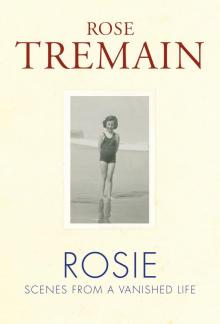 Rosie
Rosie The Garden of the Villa Mollini
The Garden of the Villa Mollini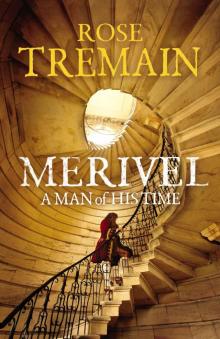 Merivel: A Man of His Time
Merivel: A Man of His Time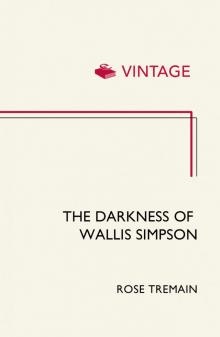 The Darkness of Wallis Simpson
The Darkness of Wallis Simpson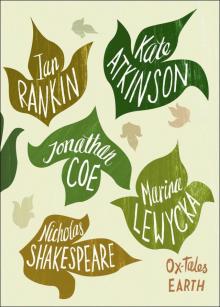 Earth
Earth Sacred Country
Sacred Country The Swimming Pool Season
The Swimming Pool Season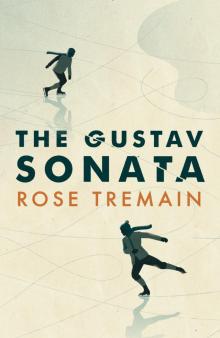 The Gustav Sonata
The Gustav Sonata Sadler's Birthday
Sadler's Birthday The Cupboard
The Cupboard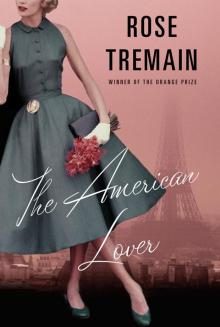 The American Lover
The American Lover Letter to Sister Benedicta
Letter to Sister Benedicta Evangelista's Fan
Evangelista's Fan Restoration
Restoration The Road Home
The Road Home The Colonel's Daughter
The Colonel's Daughter The Way I Found Her
The Way I Found Her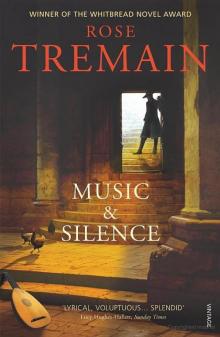 Music & Silence
Music & Silence